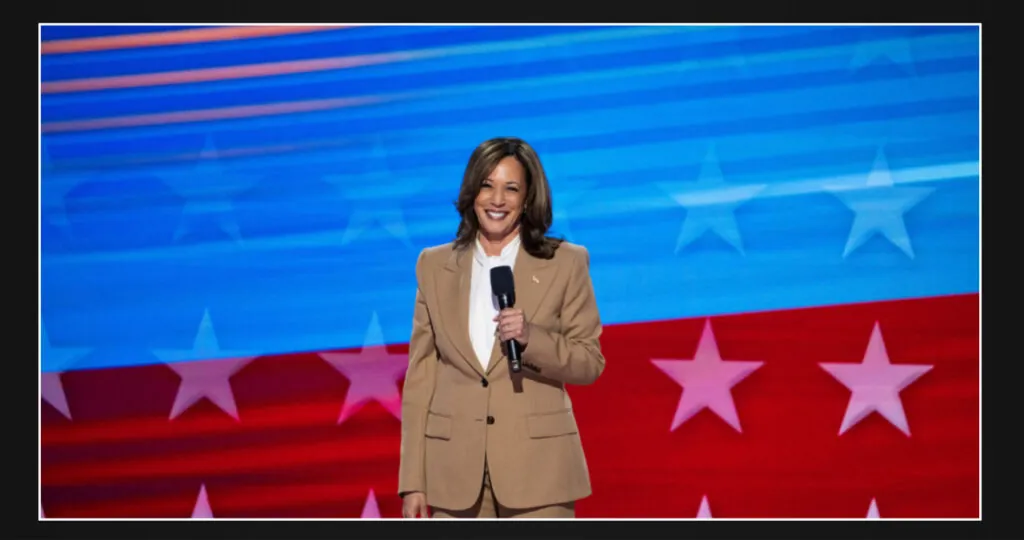Amanda Taylor, a Democrat, was motivated to take action and run for the Missouri General Assembly when she witnessed the passing of one of the most stringent abortion bans in the country. This event inspired her to step out of her comfort zone and make a difference.
Taylor, who is campaigning in a deeply conservative district, has been pleasantly surprised by the diverse range of voters expressing their support for a ballot measure in November. This measure aims to overturn the ban and protect abortion rights by making them a part of the state constitution.
“They will come out to vote against the abortion ban and support Kamala and other women on the ballot,” Taylor confidently stated on Tuesday. She paused briefly to sign a banner showing her support for Vice President Kamala Harris at the Democratic National Convention.
The Democratic Party is placing great importance on reproductive rights, as evident in their political strategy. This emphasis is prominently showcased at the convention, where various initiatives are taking place. For instance, a contraceptive-rights group has erected a large inflatable IUD near the convention venue, while a mobile health clinic is providing free medication abortions. Additionally, prime-time speeches are being delivered by women who have personally experienced the detrimental effects of state-level abortion bans.
According to recent research conducted by EMILYs List, an organization that supports female candidates who advocate for abortion rights and has endorsed Harris, it appears that the issue of abortion holds significant importance for women voters, especially those under the age of 45.
The report, which was conducted by Women Vote, the independent expenditure arm of EMILYs List, examined five battleground states: Arizona, Michigan, Nevada, Pennsylvania, and Wisconsin. According to the survey, Harris receives widespread support across various demographic groups due to her stance on abortion access.
According to the group, Harris has successfully eliminated the “enthusiasm gap” that Democrats were facing before President Joe Biden announced last month that he would not run for re-election.
According to Jessica Mackler, President of EMILY’s List, the Dobbs decision of 2022, which overturned Roe v. Wade and allowed states to impose abortion restrictions, has already started to reshape the political landscape in ways that are becoming increasingly apparent.
According to Mackler, the current research indicates that women are prepared to achieve a victory for Kamala Harris.
According to a recent CBS/You Gov poll, 56 percent of women are in favor of Harris, while 54 percent of men support Republican nominee Donald Trump. Democrats believe that in a closely contested election, women could potentially be the deciding factor that tips the balance in favor of Harris.
According to Melissa Williams, executive director of Women Vote, reproductive rights have become such a significant political issue for Democrats that it is now being discussed by everyone, including men.
I was with Rep. Lauren Underwood, a Democrat representing a suburban and rural district in northern Illinois, on the day the Dobbs decision was released.
“The world underwent a dramatic transformation, and we realized that it was time for us to take action,” Underwood expressed during a gathering of the DNC’s women’s caucus on Tuesday. She highlighted the urgency of the situation, stating that “when one in three women resides in a state with either partial or complete abortion restrictions, it necessitates a collective effort from all of us.” Underwood acknowledged the influential power and resilience of women within the group, emphasizing that their voices, as leaders, will not only secure victory in the upcoming election but also restore their fundamental rights and freedoms.”
Abortion, however, is not the sole issue contributing to the gender gap and energizing Democrats.
Trump’s offensive comments towards women, along with a remark made by his running mate, Sen. JD Vance of Ohio, belittling “childless cat ladies,” have served as a source of inspiration for Democrats.
Julie Pierce, a retiree and a first-time Democratic delegate from Georgia, proudly declared, “I’m a childless dog lady.” She wore a shirt that boldly proclaimed, “Madame President 2024.”
“Will JD Vance try to undermine my worth? It feels as if he’s implying that I shouldn’t concern myself because I’m just a delicate woman…”
“I’ve experienced that before, and I have no intention of going through it again,” she affirmed.
The convention was brimming with displays of female empowerment.
“I feel privileged to stand alongside the incredible women who consistently make things happen,” expressed Elizabeth H. Shuler, the AFL-CIO’s trailblazing first female leader, as she addressed the delegates at the women’s caucus. “We are the driving force behind this party, the very backbone that supports it.”
Shirts featuring the phrase “Trust Democratic Women” were being sold by vendors. On Monday night, Ashley Biden, the president’s daughter, referred to him as the “OG girl dad” during her introduction on the convention’s main stage.
Several speakers at the convention reflected on the importance of women’s fight for equal rights and the significance of historical milestones. Hillary Clinton, the former first lady and Secretary of State who narrowly missed shattering the highest glass ceiling in her 2016 presidential campaign, paid tribute to the trailblazers who paved the way for her. She mentioned Shirley Chisholm, the congresswoman from Brooklyn, New York, who ran for president in 1972, as well as Geraldine Ferraro, the first woman nominated for vice president in 1984.
“The narrative of my life and the chronicles of our nation teach us that progress is attainable, but not assured,” Clinton emphasized. “It is a constant battle that requires our unwavering determination. We are faced with a pivotal choice – do we forge ahead or retreat? Will we unite as ‘We The People’ or allow division to prevail, pitting ‘us’ against ‘them’?”
